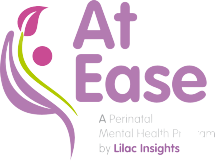Lilac Insights

10% of pregnant women1
13% of women who have just given birth1

15.6% women during pregnancy1
19.8% women after child birth1

The American College of Obstetricians and
Gynecologists recommends universal screening for
depression and anxiety disorders during pregnancy2 .


A program that complements the obstetrician’s efforts towards optimizing pregnancy outcomes. From planning pregnancy, to birth and beyond, get support from our experts in reproductive mental well-being.
AtEase deploys evidence-based approaches and therapeutic models to address the psychological needs of the pregnancy - for the mother & the family.
What do we offer?
In-person and digital consultations, while maintaining privacy and confidentiality.

Individual counselling & therapy
Couples counselling & therapy
Family counselling & therapy
Importance of reproductive emotional health:
Hormonal changes during prenatal and postnatal care can lead to emotional distress
Certain unexpected life events, such as perinatal loss can cause trauma
People with pre-existing mental health conditions are more vulnerable to depression, anxiety or mood disorders
Other stressors - Work-life-balance with a full-time job or financial stress related to raising a child, can affect pregnancy too
When does a patient require support?
Any patient experiencing the following symptoms for a period of 2 weeks or more:
Bouts of anger, sadness,
irritability
Lack of interest, change in eating and sleeping habits, trouble concentrating
Thoughts of hopelessness, thoughts of harming the baby or self
Extreme/Irrational worry and fear or panic attacks Or Any patient whose Prenatal Screening for Mental Health (EPDS) scores are above 10
References:
1. https://www.who.int/teams/mental-health-and-substance-use/maternal-mental-health. Last accessed on 25-3-2021
2. Screening for perinatal depression- Committee opinion, ACOG, 2018, page 2